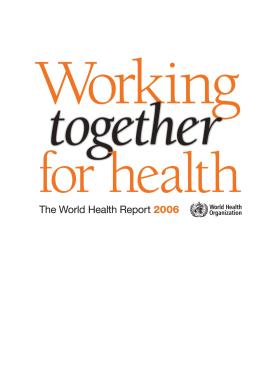World health Report_2006
World health Report_2006
In this first decade of the 21st century, immense advances in human well-being coexist with extreme deprivation. In global health we are witnessing the benefits of new medicines and technologies. But there are unprecedented reversals. Life expectancies have collapsed in some of the poorest countries to half the level of the richest – attributable to the ravages of HIV/AIDS in parts of sub-Saharan Africa and to more than a dozen “failed states”. These setbacks have been accompanied by growing fears, in rich and poor countries alike, of new infectious threats such as SARS and avian influenza and “hidden” behavioural conditions such as mental disorders and domestic violence.
The world community has sufficient financial resources and technologies to tackle most of these health challenges; yet today many national health systems are weak, unresponsive, inequitable – even unsafe. What is needed now is political will to implement national plans, together with international cooperation to align resources, harness knowledge and build robust health systems for treating and preventing disease and promoting population health. Developing capable, motivated and supported health workers is essential for overcoming bottlenecks to achieve national and global health goals. Health care is a labour-intensive service industry. Health service providers are the personification of a system’s core values – they heal and care for people, ease pain and suffering, prevent disease and mitigate risk – the human link that connects knowledge to health action.

